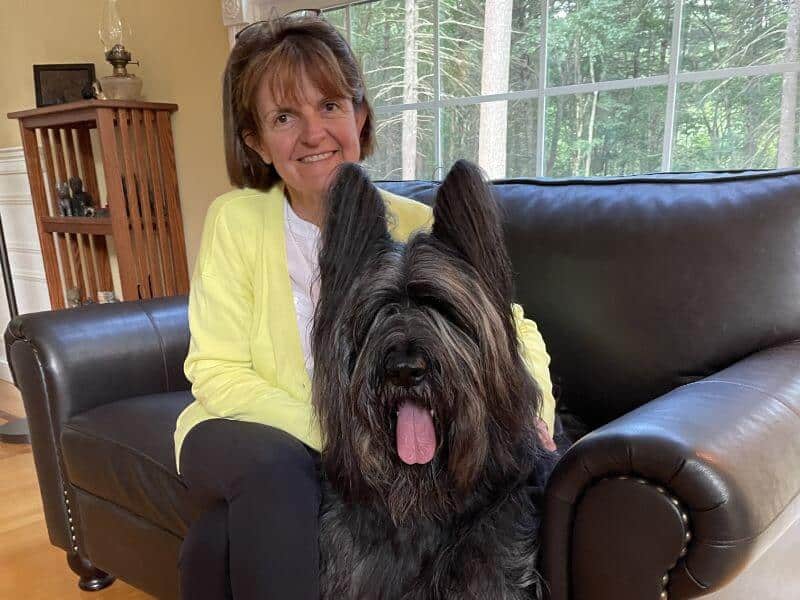Interview with Odile Smith, Breeder of Fairytale Briards
Please tell us a little bit about yourself. Where do you live? What is your breed? What is your kennel name? Do you have a website? How long have you been in dogs? How long have you been breeding dogs? Who are some of your best-known dogs?
Odile Smith: I was raised with large hunting dogs, but I fell in love with Briards and decided that I would have a Briard when I would be living in a house suited for dogs. I never turned back. Briards have been my breed for almost 30 years. Nowadays we live in Massachusetts, not too far from Boston, and I breed under my kennel name, Fairytale. You can check us out at: Fairytalebriards.com.
My best-known dogs would include Fr. Can. AKC CH Fairytale’s Balthazar le Sage, aka “Sage.” He was a BISS, BIS, WW winner, No. 1 ranked and has sired multiple champions in the US and several European countries. “Aramis,” Can. CH AKC Fairytale’s Aramis, is also quite well-known for what he achieved in the ring, but also for his exuberance. In current times, I would mention Can. CH AKC GCHB Fairytale’s Oxford BN RA IT FDC CGC and GCHS Fairytale’s Ria Verde, who are currently shown by myself for “Oxford” and by Greg Strong for “Ria.”
As a Breeder, can you share your thoughts on your breed today? Is breed type strong? Are there things to be concerned about? Are there any health-related issues? Have you worked with breeders overseas? Are pet homes typically available for your breed?
Odile Smith: Our Breed Standard describes some specific attributes that give that boxy silhouette, with a beautiful carriage. “Vigorous and alert, powerful without coarseness, strong in bone and muscle, exhibiting the strength and agility required of the herding dog.” There are many variations being presented today. Some I love and some I find not fitting the type of the Briard. I personally love the correct head of the Briard, with a beautiful stop, parallel ears placed high on the head, and a wide muzzle finishing in a 90-degree with strong jaws. The head sits on a long and strong, conic neck, providing that beautiful silhouette.
We have a coated breed and should expect proper condition and correct coat to be rewarded. Color is not a priority, since “all uniform colors are permitted except white (black, various shades of gray and various shades of tawny).” One pet peeve of mine is bitchy-looking males or females that look like males. The Briard should not be oversized or over-boned, and not be too refined either.
The health of our Briards is probably very similar to that of most large breeds in the US. We face bloat and cancer in particular.
On the topic of working with other breeders, I absolutely do. I do believe in line breeding (not inbreeding) and making sure that I “marry” dogs of the same phenotype. My dogs’ pedigrees contain two old French lines, as well as other US dogs. In fact, I just returned from the French National; always looking for connections, potential studs, or puppies.
As an Exhibitor, can you comment on recent entries in your breed? Are majors available in your area? Does your breed often participate in Companion and Performance events? How can newcomers in your breed be encouraged to join the sport of dogs?
Odile Smith: Our entries are low, majors are rare. Briards are extremely smart and can participate in any sport. There are Briards that excel in Obedience, Rally, Herding, Fast CAT, Dock Diving, etc… Briards simply love working with their owners. Participation in events can be associated with the breeder, for sure, but it is also often associated with co-location with someone who participates in events and shares the love of the sport, independently of the breed involved.
What are the biggest challenges facing the dog show community as a whole and how can we address them? And finally, what are some of the positive changes you’ve seen in your breed and in the dog show community as a whole over the past decade?
Odile Smith: Dog shows face many challenges: Entries are decreasing and judging is negatively impacted by the loss of many knowledgeable judges in recent years. Positives for me are that I have found a circle of dear friends, with some being truly a second family, and that I can continue to have educative conversations with experienced breeders, handlers, or trainers.








